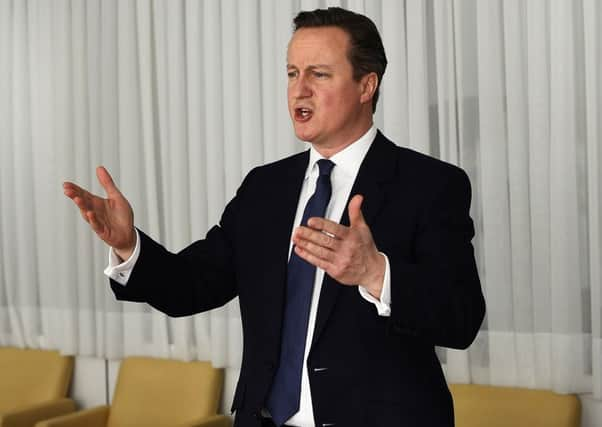Leaders: Jury is out on Britain's future in Europe


The outlook for Britain’s future in Europe from the summit in Brussels is dividing the commentators.
The pro-Europe camp say Prime Minister David Cameron’s desired changes must be fundamental, otherwise why would they be encountering so much resistance.
Advertisement
Hide AdAdvertisement
Hide AdOn the opposite side, the anti-Europeans argue that the rest of Europe don’t like the UK, and equally don’t like changes.
They believe that resistance to Mr Cameron’s reforms mean they will be watered down further and that’s why the talks have lasted far longer than had been first thought.
The fact is, unless there is a major upset, there will be concessions - as there have already been.
However, Mr Cameron is likely to emerge and declare that the deal a victory.
It has suited Downing Street to emphasise what a slog it has been, describing the talks as “hard going”.
In some ways, the Prime Minister’s insistence on a European Union re-negotiation has been quite clever, because it has kept the deeply-riven-over-Europe Conservative party from outright warfare. His stance has also diverted all talk, attention and discussion about the fundamental issues over what the EU is and what it does and whether UK voters think the pluses outweigh the minuses.
This is especially significant since the chances are that we are only three months away from a referendum. That is not a lot of time for the opposing campaigns to get fully under way. There is still a long way to go to bring the electorate up to speed so people can fully understand the issues involved, make an informed choice and be sufficiently motivated to bother to go out and vote.
On the basis of the turnout for past European elections, things don’t bode well.
Advertisement
Hide AdAdvertisement
Hide AdVoters’ memories of such marathon talks must not be diverted by how long they lasted or how little sleep everyone got.
The Prime Minister’s wife and children, who he told might not see him this weekend, will, like families across the UK, want to see something meaningful and relevant emerge from the summit.
The challenge for both camps is to energise the population so they feel drawn to participating in the debate, as happened so vividly two years ago over whether Scotland should become independent.
It is important because there is so much at stake to all of us in this vote and there is so much that many of us have still to learn about the implications before we make our choice.
The Prime Minister’s approach has dismayed some leaders, with Czech Europe minister Tomas Prouza expressing frustration at “the British approach of non-negotiation”.
Lithuanian president Dalia Grybauskaite was even more direct, stating that whatever was decided, it would be down to UK voters in the end.
So the UK’s tactics in Brussels amount to another risky political move from Mr Cameron. His similarly hazardous strategy over the Scottish referendum paid off for him – just. It remains to be seen if this one will too.
The treble chance
Lorry drivers will have collectively heaved a deep sigh of relief at the welcome news that they will be given unrestricted access to the Forth Road Bridge again from tonight.
Advertisement
Hide AdAdvertisement
Hide AdThat may have come a month earlier than previously estimated, but it is still significantly later than the assurances originally given that things would be back to normal at the turn of the year.
The 11 weeks during which heavy lorries have been banned from crossing the bridge, or severely restricted, underline the significance of the disruption caused. Dozens of extra miles have been added to every trip made by our largest vehicles, increasing costs, pollution and damage to the roads.
Ministers may point to 90 per cent of bridge traffic being disrupted for less than three weeks, but lorries transport the fabric of our everyday lives, from food and clothing to the latest electronic gizmos.
The bridge damage which forced its closure serves to remind us that the unexpected can happen, and halting traffic has a huge detrimental effect.
The Queensferry Crossing, which appears to be still on course to replace the bridge at the end of the year, will be a welcome upgrade of 51-year-old technology.
However, as we have argued before, we should not rely on it being fail-safe.
Ministers must take the opportunity that the opening affords to commit to fully refurbishing the Forth Road Bridge, so it is ready again should the unthinkable happen to its younger sister.
The two crossings, together with their venerable railway neighbour, the Forth Bridge, are marvels of Scottish engineering. Long may they all serve this vital link in our transport network.